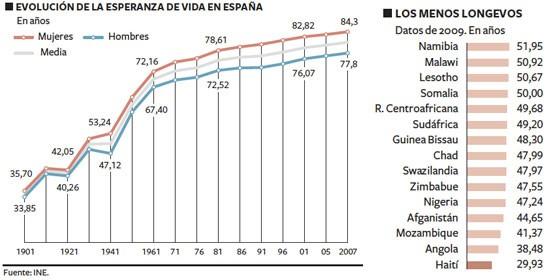 |
| Somos lo que somos |
Con independencia de la
mayor o menor trascendencia que cada persona haya dejado en su paso por la vida,
cuestión que queda a cargo y juicio de la historia, no deja de resultar
interesante, o cuanto menos curioso, analizar la vida desde un punto de vista
puramente materialista: el de la frialdad de los números. No se trata de hacer
un análisis exhaustivo de todos los datos numéricos que se pueden asociar a la
existencia humana, cuestión que ocuparía una gran extensión y causaría el tedio
de muchos lectores, sino el de exponer algunos de las más significativos que,
por sus particulares características, pueden ofrecer un mayor interés y contribuir
a hacer la lectura más amena y entretenida. Este es, en definitiva, el único
objetivo que se persigue.
Aunque los parámetros que vamos a analizar
varían de forma muy significativa entre distintas poblaciones de personas, y aún
dentro de cada una de ellas también sufren importantes alteraciones, para el
fin propuesto, que no es otro que el de la curiosidad, las cifras reflejadas,
entendidas como medias, pueden cumplir satisfactoriamente
con este cometido.
 |
| La fuerza de las estadísticas |
A lo largo de nuestra vida terrenal, nuestro cuerpo mortal, formado por la astronómica cifra de más de cincuenta billones de células, consume energía, genera residuos y realiza actividades imprescindibles para la propia existencia, así como otras derivadas necesarias para la vida cotidiana. Si aceptamos, como dato de partida, una de las últimas estadísticas publicadas como esperanza de vida en Europa (media entre varones y hembras), que arroja un valor aproximado de 80 años, podemos aproximar lo siguiente:
<> Vivimos unas 700.000 horas, de las que, aproximadamente, una tercera parte las dedicamos a dormir, lo que nos deja un resto para la vida consciente de poco más de 460.000 horas. Si de estas restamos aquellas necesarias para menesteres tales como formación, trabajo, alimentación, aseo personal, etcétera, que, cuanto menos, se llevan el 75 % de la cifra anterior, al final, para nuestra entera disposición, nos quedan, en el mejor de los casos, si otras circunstancias ajenas a nuestra voluntad no nos lo impiden, no más de 115.000 horas. Como todos conocemos lo que da de sí una hora, podemos concluir en que la vida es poco más que un suspiro. Aunque Séneca solía sostener que nuestra existencia no es breve, sino que la desperdiciamos en cosas sin importancia, la realidad es que “Tempus fugit” y que, sin apenas darnos cuenta, pasamos a la historia con el conocido epitafio de “Requiescat in pace”.
<> Durante nuestra existencia, nuestro corazón tiene que latir, como mínimo, y de forma ininterrumpida, unos 2.900 millones de veces y mover, aproximadamente, un flujo de sangre de 232 millones de litros; ciclos que, sin paradas de mantenimiento posibles, supondrían todo un reto para cualquier artilugio creado por el hombre.
Aparte de todo lo anterior, a lo largo de nuestro devenir por la vida, consumimos energía primaria por un valor medio aproximado de 1.800.000 kW.h, con diferencias muy importantes entre los distintos países de la Tierra; lo que, en términos relativos, representa una cantidad 21 veces superior a la que necesitamos para cubrir nuestras necesidades vitales.
Aparte de todo lo anterior, a lo largo de nuestro devenir por la vida, consumimos energía primaria por un valor medio aproximado de 1.800.000 kW.h, con diferencias muy importantes entre los distintos países de la Tierra; lo que, en términos relativos, representa una cantidad 21 veces superior a la que necesitamos para cubrir nuestras necesidades vitales.
C. Díaz Fdez.
Oviedo, a 25 de enero de 2012

